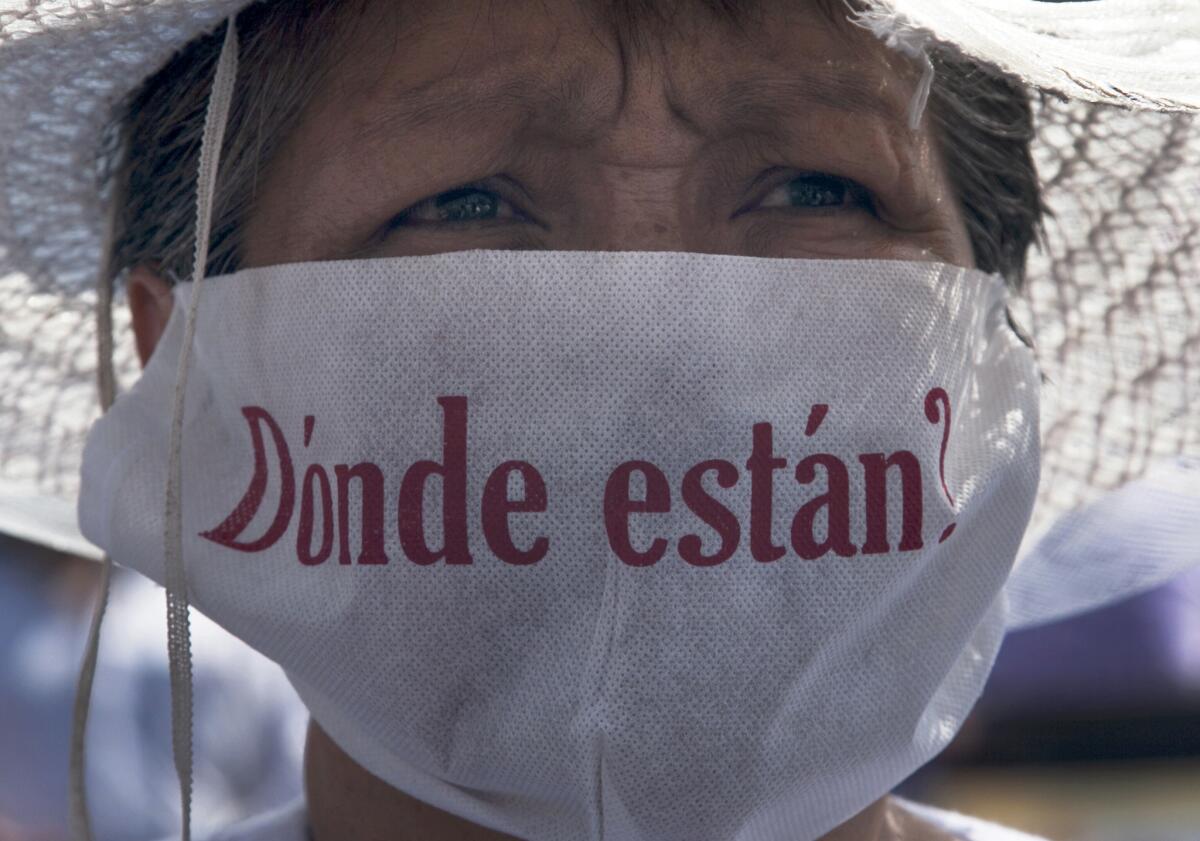Internal U.S. documents detail ‘alarming questions’ about Mexico violence

A mother with a face mask that reads in Spanish “Where are they?” marches along with hundreds of other mothers holding images of their missing relatives during Mother’s Day on Sunday in Mexico City.
- Share via
Reporting from Mexico City — The grisly discovery of more bodies and human remains in the hills of Guerrero, Mexico, raises “alarming questions about the widespread nature of cartel violence in the region and the level of government complicity,” a U.S. military report said.
The document, written by a human rights working group under the U.S. Northern Command (Northcom), was circulated internally in October after its investigation into the disappearance of 43 students in the city of Iguala on Sept. 26. It was made public this week.
It expressed concern that none of the 28 bodies pulled out of numerous mass graves in the area belonged to the missing students, raising questions about how many other people may have been killed and buried clandestinely.
Since the report was written, scores more bodies have been unearthed by search parties organized by families with missing loved ones.
“We’ve found bodies with their hands tied behind their backs, their eyes taped shut, many were killed by a shot to the head,” said Mario Vergara, 40, who leads a group of 300 families who say they have found 95 bodies buried in the dry, dusty hills around Iguala since November.
“We’ve found bodies with their mouths open – like they’ve been buried alive,” he said in a telephone interview from Iguala. “We’re doing the work that the government isn’t doing.”
The group’s Facebook page – Te Buscare Hasta Encontrarte (I Will Look For You Until I Find You) - posts updates of its discoveries and is part of a national network of people looking for their missing.
There are more than 20,000 people currently listed as “disappeared” in Mexico. Guerrero has long been one of Mexico’s most violent states, and is also a major production hub for the country’s booming opium trade.
The drug business has corrupted local institutions and complicity between the police and drug gangs is commonplace.
The disappearance of the 43 students last year prompted a national and international outcry and has been the biggest political crisis faced by President Enrique Peña Nieto since he took office in December 2012.
The students, from a rural teacher’s school in nearby Ayotzinapa, were taken away after clashing with local police.
The Mexican government claimed that the students were then handed over to a drug gang by the police who detained them, and executed them. But so far only one of the missing youths has been identified from human remains found in a local trash dump.
The Northcom internal report was made public through the National Security Archive – a Washington research group that pushes for the declassification of official documents.
The memo also refers to an incident that took place on June 30 in Tlatlaya, 150 miles south of Mexico City. The army initially claimed that its 102nd Infantry Battalion was involved in a fierce shootout with drug gang members. Twenty-two people were killed, and photos later taken by journalists on the scene strongly suggested that some of the dead had been summarily executed.
Further investigation resulted in the arrest of an officer and seven soldiers for what Human Rights Watch called “a horrific massacre.”
Three of those detained – a sergeant and two soldiers - have been charged. The Northcom report refers to them as “extrajudicial killings,” adding that “as more facts come to light, there is greater acceptance that the military was involved in wrongdoing.”
Another declassified document, also obtained by the National Security Archive, stated that the U.S. Department of State had suspended U.S.-funded assistance to the 102nd battalion pending the results of the investigations.
Bonello is a special correspondent. Cecilia Sanchez in The Times’ Mexico City bureau contributed to this report.
More to Read
Sign up for Essential California
The most important California stories and recommendations in your inbox every morning.
You may occasionally receive promotional content from the Los Angeles Times.









